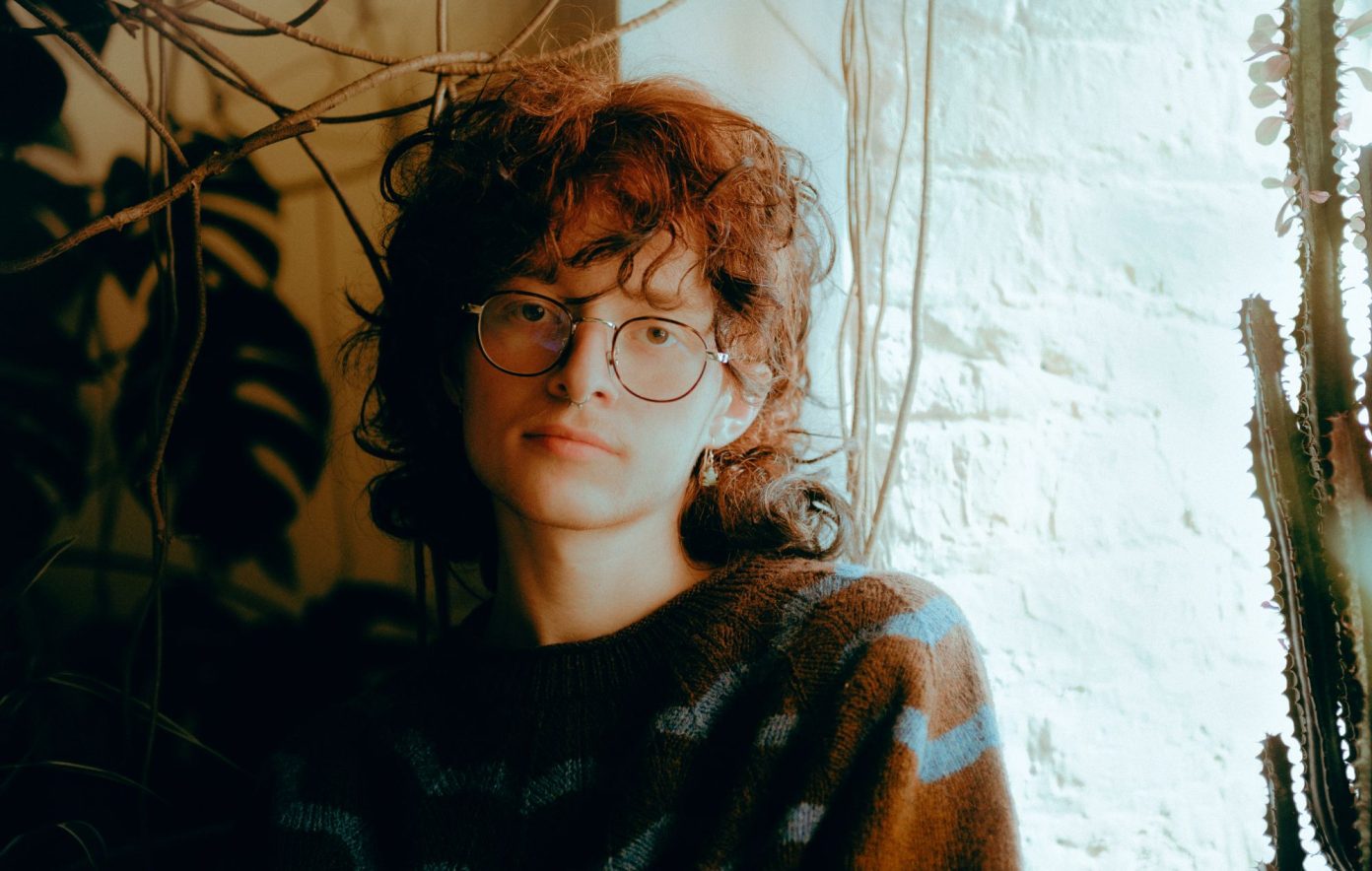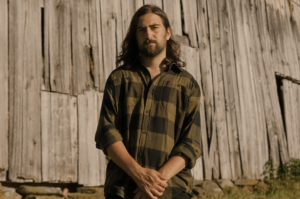Cottagecore. It’s soft, it’s romantic, and it’s reminiscent of green grass and bright blue skies where the sun shines on all living things. In the midst of friendly frog creatures and spotted mushrooms (not poisonous toadstools), it’s easy to forget what exactly lies beneath the earth, which may not seem quite as pretty down under. Cavetown sets out to explore just that in worm food (2022).
In general, Cavetown’s music has an almost otherworldly quality, like a reality slightly suspended from this one, and his latest album worm food is no different. He builds his world through idealized aesthetics including elements of cottagecore, which he’s experimented with in past albums like Animal Kingdom (2019) and Lemon Boy (2018). Unlike those carefree explorations, however, worm food’s unlimited childlike wonder becomes crushed by the bounds of adulthood in this album. This world has little frogs in love, but also the responsibility of doing laundry and the awful realization of growing older that comes with it. With the aid of collaborators both old (Chloe Moriondo) and new (Vic Fuentes of Pierce The Veil and Beabadoobee) Cavetown spins the tale of an idealistic, romanticized version of the real world, while still showcasing all the nasty, under-the-surface parts of it too.
Cavetown starts off his album with its title track, making for an interesting introduction to his fantasy world. Rather than beginning with a happy “once upon a time” befitting a fairy tale, he dives straight into the nitty-gritty—quite literally into the dirt with “worm food.” Originally released as his third single preceding the album, the song isn’t a reference to a compost bin, encouraging people to make use of their food scraps. Rather, it’s meant to be about Cavetown himself. In this case, worm food is a less horrific term for a body that’s six feet under. Here, Cavetown is admitting his feelings of insignificance, at times wishing he “didn’t matter to anybody.” Even though he recognizes that he does impact others, he still ultimately feels as though he doesn’t truly belong anywhere, thus making him worm food. This idea of decomposing in the ground is an almost censored version of the darker themes he’s explored in his older music like “Empty Bed” in which he more explicitly states the harmful thoughts he’s had about himself. In this way, “worm food” is more passive, suggesting his willingness to go with the flow and go through a more natural process of deterioration, even if it is equally as harmful. The mellow, futuristic beats tone down the overall angst of the song but do little to disguise its message. Here, it’s as if Cavetown is showing the worst of himself before even suggesting that there is happiness to be found.
Somehow, after that bleak start, Cavetown transports back up above the surface for a modified retelling of The Princess and the Frog. In the aptly named “frog,” Cavetown paints the picture of happiness through animal imagery. He’s “rollin’ around like a piglet” and is “laid down like a cow,” but is still worried that the secret of his amphibian identity will come out to his lover. He only hopes that his “princess” will still love him when the truth is revealed. Even though he is the frog in this scenario, he doesn’t categorize himself as the prince, only asking for kisses to help him feel better because his “head’s gone funny.” Coupled with the heavily tuned ribbits during an instrumental break near the end, Cavetown’s fairy tale turns into an almost nursery rhyme akin to “Old MacDonald Had a Farm” without all of the farm animals. It’s wonderfully juvenile and entirely precious. Who wouldn’t want to imagine themselves as “two amphibian lovers”? In fact, is that not what many speculate the children’s Frog and Toad novels are about?
There’s charm in creating music from this younger perspective—it’s seeing something special in the mundane that not only makes life seem so much sweeter but also makes the pain so much more devastating when it comes. On “wasabi,” Cavetown asks to be pictured “softly like a ball of wasabi,” with rhythm and imagery fit for a children’s picture book, but followed by this mellow plea is the heavy weight of missing someone, which he states over and over again. Though “it’s only been an hour” that “turns into a year,” he doesn’t sound frustrated or even particularly sad, he sounds overwhelmingly defeated. It’s a statement of fact, not a request to come back. “wasabi” is the acceptance of growing up and venturing out, even if it means missing his friend who hasn’t properly left, who just doesn’t feel the same way about him.
As a whole, the album is incredibly cohesive, transitioning from one song to the next in a seamless fashion. It plays out from the surprisingly upbeat synthetic sounds of “kill u” to the calming slow-tempo acoustic guitar of “i swear to god” with Vic Fuentes and his pop-punk yelling somewhere in between. Though unexpected, it makes great news for everyone who had an emo phase in middle school (or maybe are still going through it now) and religiously listened to Pierce The Veil.
Despite the happy little world he creates, Cavetown winds back to his roots, singing about his innermost struggles with minimal instrumentals in order to display his vulnerability; it’s what made him so popular—and so relatable—in the first place. While Cavetown strayed from the simplistic sounds of his 2015 self-titled debut on Animal Kingdom and Lemon Boy, on worm food he’s back to his original formula. Though it’s nice to think about being nicer to one’s younger self in “1994” and to “fall in love with a girl,” reality also tends to come crashing down, even when reminiscing. Both “grey space” and “juno” detail Cavetown’s struggles with mental health. He outlines his conflicting desires to stay in the “comfortable” bubble of depression, even though he recognizes he is wasting away, and his reasons to stay alive, particularly to take care of his cat Juno. They’re both beautifully haunting in their own ways—the fun tones of “grey space” sound optimistic despite the song’s subliminal message, while “juno,” naturally, reads like a soft-spoken lullaby dedicated to a beloved pet.
worm food is very quintessentially Cavetown in that it takes from all of the types of music he’s experimented with. The overall genre is indie, yes, but it’s also bedroom pop, a little soft alt, and a bit of indie rock (courtesy of Fuentes). Within this style that he’s curated, Cavetown has also created his own niche. Somehow, his music sounds like it should belong in the soundtrack of an early 2000s teen drama with “heart attack,” but also an indie video game with “worm food.” Though he hasn’t written for a major movie, Cavetown does have a knack for creating music that sounds like it belongs on a Minecraft music disc, and it probably helps that he has interpolated Minecraft music in the past. His two-single EP from earlier this year is quite literally about the block world. Both “squares” and “y 13” (the latter of which is the in-game location of the highly-coveted diamonds) take both the sounds and story of the game. Interestingly enough, a quick Google search will also reveal that worm food is an important “boss-summoning item” in Terraria, another pixelated, boxy game—perhaps it served as another source of inspiration for Cavetown.
With its images of childhood story books and blocky video games, worm food’s dominant theme is escapism. It’s about wanting to still be a kid but having to accept the harsh reality of growing up. “1994” is an ode to the child Cavetown once was and his longing to feel happiness the way he did when he was younger, but “laundry day” is the quiet acceptance of the duties of an adult. It’s not a perfect, fairy-tale ending to a story or even the album as a whole, but it still exhibits a sort of warmth; it is possible to be “ignoring how it hurts” and “delaying getting old,” while also then looking at the bright side, which shines like the sun. On “laundry day,” Cavetown’s “gonna shrink your shirt,” but it “makes a perfect fit for [him].” Slowly but surely, he’s growing into what scares him most: adulthood. The album perfectly captures this arc, all the way from “worm food” to “laundry day.”
Cavetown could have reached for the stars, but he didn’t. Despite his earlier space motifs in hits like “Meteor Shower,” he decided to stick to the ground and go even deeper into the earth. So yes, he’s worm food. But on a brighter note, that means he still has a purpose. Perhaps one day we’ll all return to the ground and become worm food ourselves—the reprieve sounds nice.
VOICE’S CHOICES: “frog,” “juno,” and “laundry day”





